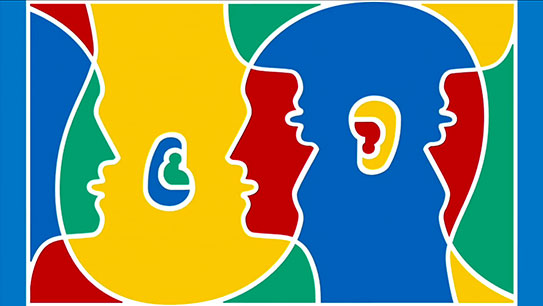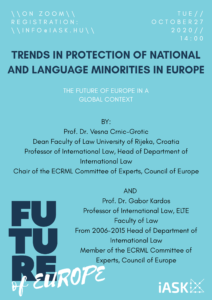Research & Studies

The lecture was held by Prof. Dr. Vesna Crnic-Grotic (Dean Faculty of Law University of Rijeka, Croatia, Professor of International Law, Head of Department of International Law, Chair of the ECRML Committee of Experts, Council of Europe) and Prof. Dr. Gábor Kardos (Professor of International Law, ELTE Faculty of Law, From 2006-2015 Head of Department of International Law, Member of the ECRML Committee of Experts, Council of Europe)
(Dean Faculty of Law University of Rijeka, Croatia, Professor of International Law, Head of Department of International Law, Chair of the ECRML Committee of Experts, Council of Europe) and Prof. Dr. Gábor Kardos (Professor of International Law, ELTE Faculty of Law, From 2006-2015 Head of Department of International Law, Member of the ECRML Committee of Experts, Council of Europe)
The experts did not paint a rosy picture in the webinar “Trends in the Protection of National and Linguistic Minorities in Europe” hosted by the Institute of Advanced Studies, Kőszeg on 27 October. The event was the latest in the ‘Future of Europe in Global Context’ series of iASK lectures
Listing one of the greatest achievements of the last twenty years has been ‘that in many of the states. we have managed to make them realize that they are a multilingual society; in many countries people were just not aware that there are also citizens…who use different languages, and that these different languages don’t have a lesser value just because the number of speakers is smaller’ said Vesna Crnic-Grotic, Chair of the Council of Europe’s Committee of Experts for the Charter for Regional or Minority Languages.
Professor Gábor Kardos, former head of the Department of International Law at Eötvös Loránd University, also a member of the CoE Committee of Experts, analyzed the challenges and reactions currently faced by the European institutions concerning minority languages.
Professor Crnic-Grotic, who is also the head of the Department of International Law at the University of Rijeka, has guided the audience through the history of the protection and promotion of minority languages. Until the early 1990s, there was no international convention that specifically addressed regional and minority languages. Although the United Nations adopted the International Covenant on Civil and Political Rights as early as 1966, it could only be applied indirectly to minority languages. In 1992 the General Assembly adopted the Declaration on the Rights of Persons Belonging to National, Ethnic, Religious and Linguistic Minorities, but it was only an unbinding declaration.
The first major step in the protection of minority languages was taken by the Council of Europe when it adopted the European Charter for Regional or Minority Languages in 1992. It came into force in 1998, but only 25 of the 47 member states (including Hungary) of the CoE have ratified it to date and their number is unlikely to grow in the near future. The Charter considers minority languages to be part of Europe’s heritage and provides not only for their protection and preservation, but also, where appropriate, for their revitalization and dissemination. Interestingly, it offers a ‘menu’ for member States to freely choose the tools, timetables and procedures best suited to their situation. They are also free to also decide for themselves how to apply the selected measures to their minorities and languages. Compliance with their obligations are examined by the Committee of Experts comprised by independent representatives from the signatory states. ComEx prepares a report every five years on the state of implementation. If necessary, the final decision on the report is taken by the Council of Ministers (the Ministers of Foreign Affairs of the 25 member states), which, however, can only make policy recommendations.
To illustrate the complexity of the languages issue, one needs to distinguish between minority languages (used as a traditional but unofficial language in a country and by less people than the users of the majority language), regional languages (spoken in a given area regardless of national affiliation) and between the language(s) of migrants and those minorities who do not wish to register their language as a minority language (the latter two categories are not even covered by the Charter).
The ultimate goal of the Charter is the non-discrimination of the minority languages, to promote tolerance and understanding towards them while also taking the wishes of the minorities into consideration.
According to Professor Kardos, achieving this goal is hampered by serious challenges. The protection of minorities in each country is overshadowed in many places by the influx of migrants, secession from the majority state, the lack of political will and the fact that the CoE has not been able to make much progress on linguistic protection in the past more than twenty years.
According to the professor, each signatory country is capable of offering ingenious explanations as to why it is not fulfilling its obligations. These include the need for more time, having to cope with more urgent tasks, minorities do not want to do their part, etc.
The European Union is not biting the bridle to act either. The Commission needs to devote its attention to a number of other issues. It argues that several pieces of EU legislation to protect the rights of minorities is on the books already, that the use of minority languages in the organization would mean a huge increase in costs and the issue of Romas and migrants is in itself a very complex issue that needs to be addressed.
In the hope of making progress the European Minority Protection Initiative (MSPI) was launched. 1.3 million citizens from more than seven Member States have signed the related document, which, if accepted, would oblige the Union to protect the cultural and linguistic diversity of minorities within the Member States, to provide budgetary resources and funds, to ‘reflect’ minority membership in the European Parliament. existence and prohibit discrimination on the basis of language.
Negotiations are still ongoing between the European Commission and Parliament. The initiative itself is not binding on the EU bodies, so there is no guarantee of acceptance. There needs to be agreement on whether to implement any element of the initiative at all, and if so, how, when and from what funds it will be applied. The Covid-19 epidemic has also slowed down the process and the prospects for success are uncertain.
“At present the Minority SafetyPack Initiative seems to be the only thing which provides a kind of hope inside the EU for a well-established or better protection of national and language minorities” concluded Professor Gábor Kardos.
iASK’s lecture series – The Future of Europe in a Global Context was held on the 27th of October, 2020 at 2 p.m.